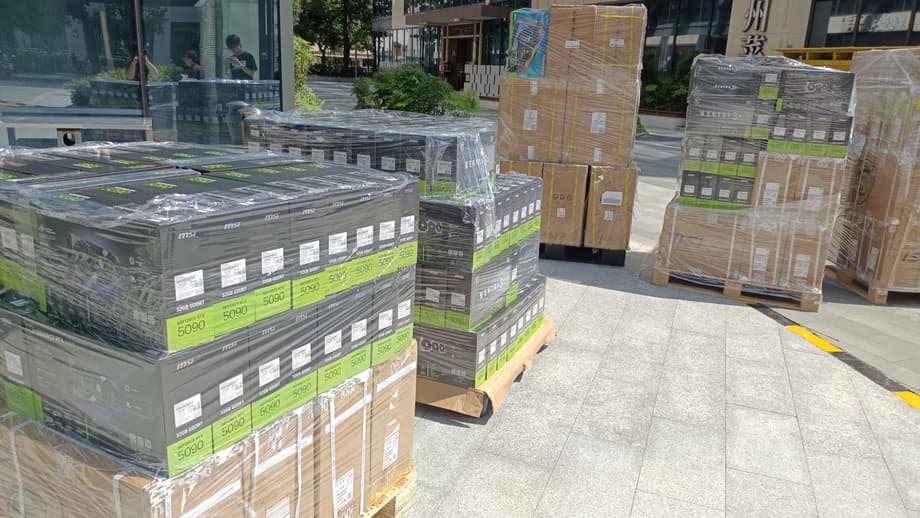Photos of RTX 5090 pallets spark export and warranty concerns
A viral image showing pallets of MSI GeForce RTX 5090 graphics cards on a street in China set off a storm of speculation about how restricted hardware is entering the country. MSI moved fast to say it has never sold or distributed the RTX 5090 in China. The company says it sells the card only in the Americas, Europe, and select Asia Pacific markets. Units now turning up in China are described as parallel imports, which are genuine products brought in by third parties without the maker’s permission. MSI also warned that unauthorized units are not covered by its warranty or support. Nvidia’s flagship gaming GPU is included in a class of high end consumer hardware that US export rules have kept out of China, so any appearance inside the country points to grey routes and reseller networks.
- Photos of RTX 5090 pallets spark export and warranty concerns
- What do export rules actually restrict
- MSI distribution policy and warranty risk
- Retailers and governments respond
- Pricing, supply, and the incentive to arbitrage
- China specific GPUs and their reception
- How to buy safely and stay within the rules
- What to Know
The photo of stacked RTX 5090 boxes, combined with stories of restricted chips reaching buyers in China, has raised questions about enforcement and about consumer risk. It is rare for large shipments to appear in public view. The image pushed the issue into the mainstream and highlighted a broader problem that has been simmering for months. Demand for Nvidia’s top tier cards has stayed high because of gaming and AI workloads. That demand created arbitrage opportunities for resellers willing to test the boundaries of export rules, regional sales agreements, and brand warranty policies.
MSI says it has traced the serial numbers of cards seen in China to third party sources outside its official channels. The company is stressing two points. First, the RTX 5090 is officially sold in regions where it has been authorized. Second, any RTX 5090 that lands in mainland China did not come from MSI’s regional distribution. That distinction matters for warranty and quality control. Official retail cards pass through partner checks and after sales support structures. Parallel import cards do not. Buyers who are tempted by stock available through informal networks face the risk of receiving a product that was repackaged, modified, or previously used, with no guarantee of service if something fails.
What do export rules actually restrict
Washington’s export controls target chips with very high performance and performance density. The goal is to limit access to compute that could be used for advanced AI training and large scale simulation. Consumer cards like the GeForce RTX 5090 sit at the top of gaming performance. Cards of that class are restricted for sale to China. That policy is why Nvidia created region specific models for China with dialed back capabilities, such as the RTX 5090D and the later 5090D V2. These versions aim to fit inside the allowed performance thresholds. Despite that, demand for the fully enabled models has not gone away. The gap between what is officially sold in China and what power users want helps fuel grey trade.
How a grey market flourished
There are several paths for restricted hardware to slip across borders. Investigations have found that some Chinese institutions acquired servers that included banned chips, with purchases routed through resellers or markets outside mainland China. Informal courier networks move individual cards in luggage from places where stock is plentiful to cities in China where prices sit far above list. Technicians in repair shops and supply hubs in Hong Kong and Shenzhen can repackage and refurbish hardware to look factory fresh. Some buyers seek cards that were modified for AI work, for example by adding memory or altering power limits. A parallel ecosystem of brokers and middlemen matches overseas supply with domestic demand. These channels do not require direct involvement from brands, which is why companies emphasize compliance while distancing themselves from any shipment discovered in China.
What is parallel import
Parallel import describes a genuine product moved across borders by someone other than the manufacturer or its authorized distributor. The practice occupies a legal gray area in many countries. In China, buying a parallel import is not illegal for the end customer. The risk falls on exporters who break rules in their home market or misdeclare goods. From a buyer perspective, the biggest concern is after sales support. Brands usually restrict warranty to the region where a product was first sold by an authorized channel. That policy is designed to maintain quality control and to prevent arbitrage. A card that looks brand new may still be ineligible for warranty if it never passed through the maker’s official pipeline for that region.
MSI distribution policy and warranty risk
MSI says the RTX 5090 is distributed through authorized partners only in the Americas, Europe, and select Asia Pacific territories. In China, the company offers the RTX 5090D families that meet local compliance. Units in China that carry RTX 5090 branding are treated as unauthorized. MSI warns that products obtained from parallel channels may be resold, refurbished, or tampered with, and are not eligible for warranty, repair, or technical support. The company points to serial number tracking to identify where a unit was originally shipped and whether it is covered.
When a GPU looks new but is not
Consumer scams have expanded as demand for high end cards surged. One buyer in France ordered an MSI RTX 5090 from a large online marketplace and later discovered the GPU core and memory chips were missing. The box was sealed and looked legitimate from the outside. Inside, stripped screw heads and a worn PCIe contact suggested prior handling. The card would not power up because its main components had been removed. This type of fraud can occur when inventory is tampered with before it reaches a warehouse or when returns and swaps are not properly checked. In other cases, counterfeiters insert old boards inside new shells. High resale prices make the risk worth it for bad actors who harvest parts for profit.
Cross border warranty confusion
Warranty policies vary by brand and by region, which creates frustration for travelers who buy a GPU abroad. A well meaning buyer may register a product online and see coverage listed, then discover that the repair center in their home country will not process an RMA because the unit is an import. Another common scenario is a buyer who uses a forwarding service in a third country and later runs into warranty blocks because the reseller was not authorized. Some brands offer bring in service only in the country of purchase. Other brands offer regional or global support, but with exclusions for items not bought from approved channels. The result is a patchwork that rewards buyers who check warranty terms before paying for a card outside their region.
Retailers and governments respond
Retailers in several countries have tried to curb bulk buying that feeds the grey market. In Japan, at least one store posted signs to stop the sale of RTX 5090 and RTX 5080 cards to tourists. The store had previously blocked tax free purchases but found that policy did not slow resellers enough. Staff now verify local residence at checkout for the most sought after GPUs. The move reflects a simple reality. Cards that sell at or near list price in Japan can fetch a premium in China. Blocking tourist sales helps keep inventory available for domestic customers and reduces the flow of cards that end up in cross border channels.
Law enforcement and smuggling cases
Authorities have pursued cases tied to restricted GPU shipments, and reports have described seizures and arrests connected to export violations. The numbers are large because a small quantity of high end cards is worth millions of dollars. Some cases involve shell companies and complicated routes through transit hubs like Hong Kong and Singapore. Others involve ordinary couriers who pack a few cards in luggage and make repeated trips. Throughout, brands keep their distance, saying they work within international rules and do not authorize restricted products for China. That position is consistent with the way distribution works. Vendors license product families by region and rely on partners to follow the rules. If a batch shows up in a forbidden market, it likely got there through resellers who took advantage of gaps in enforcement.
Nvidia’s regional lineup reflects that compliance framework. In China, the company offers the RTX 5090D and 5090D V2 instead of the standard RTX 5090. Partners echo that approach and remind resellers that only the approved models should be sold inside China. Despite those limits, buyers keep searching for unrestricted cards that enable faster AI inference and top tier gaming. That sustained demand explains why photos of large piles of RTX 5090 boxes in China resonate with gamers and system builders.
Pricing, supply, and the incentive to arbitrage
Pricing momentum in the US adds fuel to cross border arbitrage. The RTX 5090, which often sold above its 1,999 dollar list price early in its life, has recently hit MSRP at large retailers for some partner models. The RTX 5080 has also seen frequent discounts, including steep price cuts on prebuilt desktops. That trend makes it easier for resellers to buy stock at attractive prices in North America or parts of Asia, then ship or carry units to China where prices can be much higher. A gap of several hundred dollars per card is enough to justify airfare for bulk buyers, and even small price differences add up for traders who move dozens of units each month.
AI demand shifts the market from gaming to compute
The AI boom altered how people value consumer GPUs. Shops in China and nearby markets offer modifications to turn gaming cards into workhorses for AI inference. That can involve adding memory, unlocking power headroom, or adapting cooling. A few businesses specialize in repackaging consumer cards into rack mountable units. The work is not always stable or safe, but buyers accept the tradeoff because it boosts performance for model development. Every card diverted to AI use is one fewer card available to gamers. This shift mirrors an earlier period when cryptocurrency miners purchased gaming GPUs in bulk. The AI use case is more durable because companies of all sizes are building inference clusters, and many do not need enterprise features as long as price per unit of compute looks favorable.
China specific GPUs and their reception
Nvidia has launched or proposed several products tailored for China to meet export rules. These include RTX 5090D families and workstation models that reduce compute or memory bandwidth to sit under policy thresholds. One of the workstation cards designed for China, the RTX 6000D, reportedly faced weak demand. Analysts cited multiple reasons. Performance reductions limited appeal for AI labs. Buyers also weighed other options, from domestic accelerators to previous generation cards available through unofficial channels. Pricing near seven thousand dollars placed it in a tough middle ground, especially when modified consumer cards undercut it on cost while offering more memory. Public debate inside China has also cooled appetite for US chips in some sectors, as buyers question service access, future software support, and supply continuity.
Why a D model exists
Export rules measure raw compute and performance density using metrics that blend processing throughput and interconnect capability. Vendors can change clocks, bus width, memory bandwidth, or link speeds to bring a product inside the limits. Doing that creates a split lineup. One family serves the global market outside restricted regions. Another family, carrying the D designation, is cleared for China. The downside is confusion among buyers who see the familiar name but do not realize how much performance was trimmed. That confusion creates fertile ground for grey market traders who promise full performance cards.
How to buy safely and stay within the rules
Shoppers who care about warranty and reliability can take several practical steps. Check the manufacturer’s list of authorized retailers for your country before you buy. Confirm that the exact model number is sold in your region and that the seller is listed as an approved partner. Register the serial number right away and keep a copy of the sales invoice. Test the card promptly and look for signs of tampering such as stripped screws, scuffed PCIe contacts, reprinted labels, or mismatched box seals. Avoid paying cash to middlemen who offer no receipt or service contact. If you are traveling, do not assume that a global warranty applies. Many brands limit service to the original country of purchase. Read the warranty document and ask the brand to confirm coverage for units bought abroad.
IT managers and researchers should also protect their organizations. Buying restricted chips through unofficial channels can trigger penalties and damage vendor relationships. Develop a vendor of record policy, verify the chain of custody, and require that resellers certify compliance with export laws. Keep records of purchases and serial numbers. If you operate in China, stick to models that are approved for sale there and avoid mixing imported cards into production clusters. The short term gain from extra performance is rarely worth the risk of downtime, loss of support, or greater scrutiny.
What to Know
- MSI says it does not sell or distribute the GeForce RTX 5090 in China and that any units seen there are parallel imports outside its official channels.
- The company warns that unauthorized RTX 5090 cards in China are not covered by MSI warranty, repair, or support.
- US export rules restrict high end GPUs for China, which led Nvidia to create region specific RTX 5090D families with reduced performance.
- Photos of large stacks of MSI RTX 5090 boxes in China fueled concerns about grey market shipments and enforcement gaps.
- Reports describe smuggling routes and reseller networks that move restricted GPUs through transit hubs and personal luggage.
- Retailers are responding, with at least one store in Japan refusing to sell RTX 5090 and RTX 5080 cards to tourists to slow bulk resales.
- Consumer scams have risen, including cases where a card arrives sealed but contains missing or swapped parts.
- Warranty coverage often depends on region, and many brands will not service a GPU purchased outside authorized channels.
- US pricing for RTX 5090 and RTX 5080 has moved lower, which increases arbitrage pressure into markets where prices are higher.
- China specific workstation and gaming models have seen mixed reception, as buyers weigh performance, cost, and the availability of unofficial alternatives.












